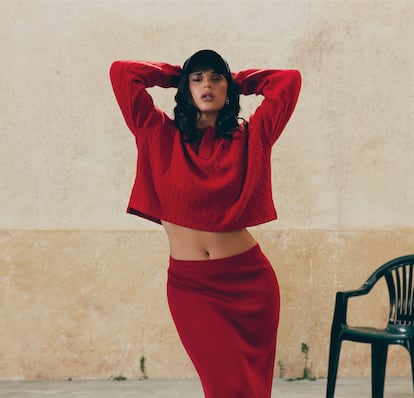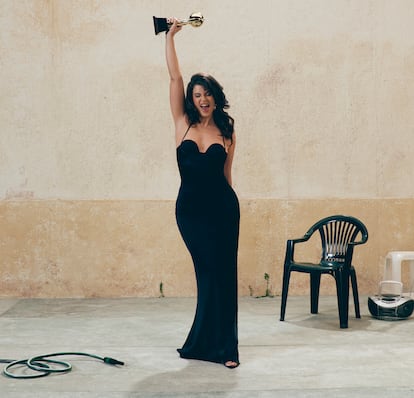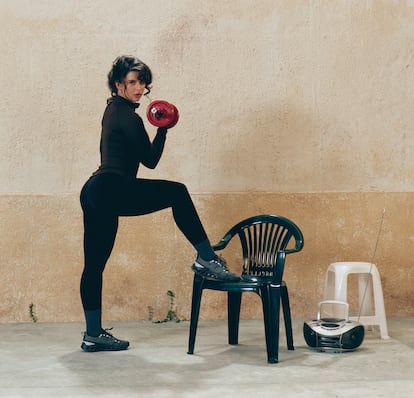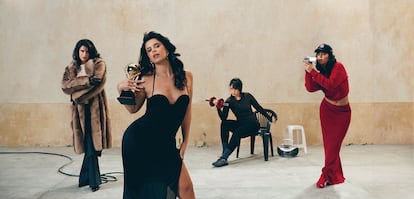Nathy Peluso: ‘I’m a hedonist, so there’s no fear of eating on my end’
In the middle of her ‘Grasa’ tour, the singer speaks of the importance of not losing oneself, the power of not fitting in and the strength that lies in embracing versatility

“¿Qué me pongo para ser sorprendente, curvilínea y elocuente?,” (“What do I wear to be surprising, curvaceous and eloquent?”) raps Nathy Peluso (Argentina, 30 years old). The line has shifted from being a mere question to the name of a campaign that features the winner of three Latin Grammys posing for Adrián Cuerdo, a photographer who occupies a special place in the artist’s heart. “The Zalando team proposed this campaign to me, and everything happened so naturally. The photos have been very pretty and we worked with Adri, who took photos of me early on, for [my 2018 album] La Sandunguera. Our reunion was very emotional,” Peluso says from Mexico, after having to postpone the interview for a few days after coming down with the flu. “Since I’m so demanding, touring is a really intense process and sometimes I get sick. It’s important to be very consistent so that you stay healthy. This job is like being an athlete and I recover fast, because my body is ready and I’m well-trained, in every sense,” she says.
She’s in the thick of her Grasa tour and its string of sold-out shows. The Sónar music festival has proudly announced her as one of the stars of its 2025 edition. “In just a few years, she has gone from performing at the old SonarXS to headlining the lineup,” says a press statement from the musical giant.

Question. They say everything delicious makes you fat. In the era of Ozempic, is Grasa an homage to enjoyment?
Answer. I am a hedonist, so there’s no fear of eating on my end, honestly. You can look at the word grasa [Spanish for the noun “fat” or “grease”] in many ways. When it comes to music, playing “with grasa” means hitting a groove. The title isn’t really geared towards food, though at the same time, it is, because it’s always implicit in my philosophy: I’m a bon vivant and I like my pleasures.
Q. The album features many ballads. Are they good for cutting the fat from, unburdening one’s heart?
A. Totally. I love the ballads and the song Envidia [Envy], which is really powerful. We’re playing it live and it’s turned out to be really special to share with people. The album’s ballads aren’t that easy to digest, there are some radical ideas there. But at the end, without a doubt, they help to unburden one’s little heart, don’t they? They help you to feel.
Q. El día que perdí mi juventud (The day I lost my youth) speaks of the loss of innocence. Being such a visible artist, is it necessary to put on a little armor and lose one’s naivete?
A. It’s a song about connecting with your intimate side, of personal discovery. I think that there are moments we experience at different moments in our life. There are songs that one makes to save oneself, and perhaps to save the other people who hear it. It’s about sharing the processes, and I really believe that song is the one that best reflects that internal search.
Q. About that internal search — how do you stay in touch with yourself? It can’t be easy in the world in which you move.
A. I dedicated myself to that years ago and I have a well-formed ecosystem. I stay true to my instincts and to what I feel. I surround myself with people who I love and who are good for me. I take good care of my energy, which I consider essential to staying well-aligned.
Q. In the BTS of the Zalando video, you say you’re sexy, but “not pretentious.”
A. I like to be natural. I believe we all have that implicit beauty that comes from being natural. Sometimes when you try too hard to please others, the process becomes a bit forced and a bit more plastic, and it doesn’t convey the same thing as when you are 100% real. I think in the end, you have to trust that there will always be someone who can see that natural sparkle we have.
Q. Is it important to you to fit in, or do you enjoy being outside the norm?
A. It’s never been important to me to fit in — and in fact, I never have. But that is something I’ve always seen as a good thing. In the end, it’s all about the perspective you have on things. I feel like not fitting in allows you the possibilities of being different, and standing out will always increase those possibilities, because that’s what life is about: standing out, being unique.
Q. The song Erotika is a homage to the erotic salsa of the 1990s. The lyrics say, “Mi tío me dijo que antes eran las cosas de otra manera. La gente hasta se quería.” (“My uncle told me that before, things were different. People even loved.”) Why is loving and being loved complicated now?
A. I think that they’re moments. The truth is, I feel that as a society, we are in a moment of retrospection, analysis and fear. Sometimes people are so afraid of falling in love because doing so means giving themselves up and putting themselves to the test. In the end, people get burned out. Without a doubt, one is afraid of suffering, although I always believe that all these experiences make you stronger, they make you grow and they make you learn. So, I always give my all and trust that whatever comes is what I have to live through. Basically, I don’t try to avoid anything. I think love is for the brave.
Q. Does it scare you to lose yourself in love?
A. To love someone well and let oneself be loved, there must be a friendship with oneself, so that one doesn’t get lost. It’s important to prioritize wellbeing, know how to choose and know how to set boundaries; all this allows one to not get lost along the way. Getting to a point in which you learn to achieve balance and take care of yourself. It’s about not losing yourself, but instead taking risks and making yourself vulnerable. The wonderful thing is that when you do that, you feel things and to learn, you have to feel.

Q. Do you still think men are afraid of powerful women, as you sing in the song Mafioso?
A. Of course, mami! That doesn’t change. When it changes, we’ll have this call again, but it seems to me that we still haven’t gotten to that change. But there’s no reason to get down about it, you’ve got to stay magreando [keeping after it], like they say here.
Q. Being a “continental breakfast,” as you’ve called yourself — do you think it’s too much to demand that a creative has it all? It seems like artists are required to have the voice, be able to dance and deliver a coherent and perfect message, with no cracks.
A. I think that a real artist isn’t overwhelmed by that, because it’s a given. An artist communicates and has something to say. Everyone has their ideals and something to share, even if it may not be what people want to hear. But in my case, I feel that the pressure comes more from my own demanding nature, not so much from having to fit into people’s canons.
Q. Being demanding of yourself and knowing that your imperfections are what makes you unique. How do you manage not to be bothered by them, being such a perfectionist?
A. Bother me — they always bother me, to tell the truth. That is something that you live with, because being demanding of oneself has its pros and cons. It’s important to know how to work with that and gradually learn how to place better limits as your own boss, which you are. I don’t complain. I like the life I’ve built within those parameters.
Q. As an ambitious woman, is there a way to reach a healthy amount of ambition?
A. I have no idea. The truth is that until now, all the ambitions I’ve had have been a bit extreme and excessive, but they’ve also brought me to a place that I’m proud of. I think that as you grow, you learn to deal with every one of these processes. I began this career when I was very young, and I’ve always dreamed big. Because of that, it’s consumed me for a long time, but it’s also led me to achieve big things. And so, I think that ambition is an engine. An engine that consumes you, but is a normal thing, because with this career and this life, it’s very easy to pass that limit and have everything transform into a constant search for progress, which pushes you to forget the small details of everyday life. It’s important to meditate and also concentrate on the small things, that’s how you find balance.
Q. You’ve said that the stage is your drug. Mónica Naranjo recently told EL PAÍS that she doesn’t want to die onstage, that she’s not “that much of an artist.” What about you?
A. In reality, I also hope I don’t die onstage. I’d prefer to do so in the country with horses, eating well — but I would like to be on the stage until I’m very old. It’s something that makes me very happy and I feel that for an artist, it’s a wonderful school, to get up there and experience the exchange that happens with your public. It would make me very happy to never leave that sacred space, but everyone has their own experience and learning process.
Q. Have you always had the strength to take charge of your career, or did you find it difficult to find your own voice? You finished an album and didn’t want to release it because you weren’t satisfied with it, which is a bit complicated in your industry.
A. Ever since I arrived in this industry, I knew my criteria. There are no bigger demands than my own. The most difficult thing was to deal with my own inner leader, more so than with the industry.
Q. On your social media, you shared a short film in which you offer a look at the creative process of Grasa. You say, “Imagine waking up one day and saying that what you’ve done is shit. That’s what it is to make an album.” A brutal way to unmask the creative process once and for all, when it’s often so idealized, isn’t it?
A. It’s a very intense process and if you really dedicate yourself and give it your whole body, it’s like birth. You don’t go back to being the same person after dedicating yourself like that. Making that album changed my life, not releasing it and then making Grasa. They’re vital lessons and it’s true that people really idealize these processes, but that’s normal. Ultimately, it all looks like a movie from the outside, but inside, it’s a very big commitment. Although, now that I think about it, it’s also like living a movie — just maybe not as rosy as people imagine.
Q. In the documentary you also say, “Imagine sending a record to hell and it then being the prelude to the record of your life.” Is Grasa the record of your life?
A. All the music I do is the soundtrack of my journey. I don’t know if it will be the record of my life, it’s too soon to say. I just turned 30 and I have many more records to make, but without a doubt, it’s an album that for the past year and a half has impacted my way of seeing life, of seeing my public, of seeing my career and the way I see the possibilities. I hope that they’ll all be like that, but it’s so beautiful to learn through the music.
Q. To make the album, you were inspired by identity crisis, the crisis brought by success and the crisis of ambition. Is crisis a good engine?
A. For me, crisis has never been a bad thing, because something stronger always emerges from crisis. Far from being decadent, it is a state of alert and alarm in which ways of surviving and becoming stronger are generated. It was definitely a super-intense crisis in every way, but thank God we got through it.
Q. Can you create from a place of peace and tranquility, or does there always have to be a certain imbalance?
A. You can create from any point of view. I don’t agree that you always have to create from a place of unease or discomfort, although it is true that those states generate certain things — but so do peace and calm. I have written songs from a place of tranquility that also convey that. I think that Grasa is an album on which the energy with which it was made is very noticeable. It has an aggressive, strong and intense energy. I believe that we are channels and if we give our all and are honest with what we do, the audience notices that energy. You can make music from a place of calm and convey very beautiful things.

Q. Every song on the album is accompanied by a video, in which you once again show your gifts as an actress.
A. I love all the branches of art. The more I can mix them together, the more I like it. I have fun seeing myself in those situations and challenging myself to be a character, something I’ve been doing since I was very young.
Q. Fashion also helps when it comes to interpreting and creating roles. What is your relationship with it?
A. I like to create characters and tell stories. I feel that fashion is a great tool for dressing up who we are and what we want to express. For me, it is a fundamental aspect and I have learned about it through working with it. It is unimaginable the number of times it has allowed me to tell and relate things that I have wanted to convey to my audience, from the simplest to the most complex, both when making music videos and in my everyday life.
Q. You sing, “Tienes que aprender a amarte, perra” (“You have to learn to love yourself, bitch”). How is your self-love going?
A. The truth is, I love myself and I have a lot of consideration with myself. I think that we deserve compassion and consideration with ourselves. Everyone has their ups and downs, but the truth is I always have that very steady base of my own self-love, because I feel that it’s what keeps us strong. We have to be our own friends, but I won’t deny that at the end of the day, a person also has insecurities.
Q. And those insecurities, being so visible and exposed to critics — does criticism make them grow or have you managed to get to a place where they don’t matter to you?
A. It depends on the comments. There are some that bounce off, because they’re very superficial, but others that allude to things that are more profound, perhaps touch my morals a bit more. I’m cured of fear. I’ve always been very sure of myself and I always work with care, so I do what I do with humility and respect for others.
Q. To wrap things up, in Mexico your fans surprised you with a towel printed with an image of Luis Miguel. When are we getting that collaboration?
A. I see it as an impossible dream. Luis Miguel has only done one collaboration, and it was with Frank Sinatra. I respect him too much. He’s a big inspiration for me.
Sign up for our weekly newsletter to get more English-language news coverage from EL PAÍS USA Edition
Tu suscripción se está usando en otro dispositivo
¿Quieres añadir otro usuario a tu suscripción?
Si continúas leyendo en este dispositivo, no se podrá leer en el otro.
FlechaTu suscripción se está usando en otro dispositivo y solo puedes acceder a EL PAÍS desde un dispositivo a la vez.
Si quieres compartir tu cuenta, cambia tu suscripción a la modalidad Premium, así podrás añadir otro usuario. Cada uno accederá con su propia cuenta de email, lo que os permitirá personalizar vuestra experiencia en EL PAÍS.
¿Tienes una suscripción de empresa? Accede aquí para contratar más cuentas.
En el caso de no saber quién está usando tu cuenta, te recomendamos cambiar tu contraseña aquí.
Si decides continuar compartiendo tu cuenta, este mensaje se mostrará en tu dispositivo y en el de la otra persona que está usando tu cuenta de forma indefinida, afectando a tu experiencia de lectura. Puedes consultar aquí los términos y condiciones de la suscripción digital.









































